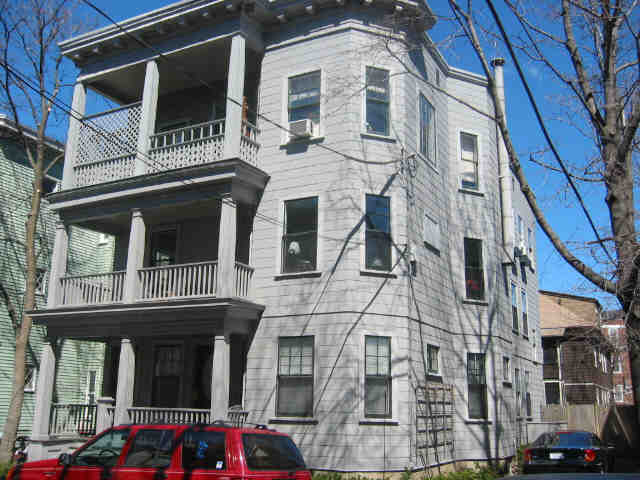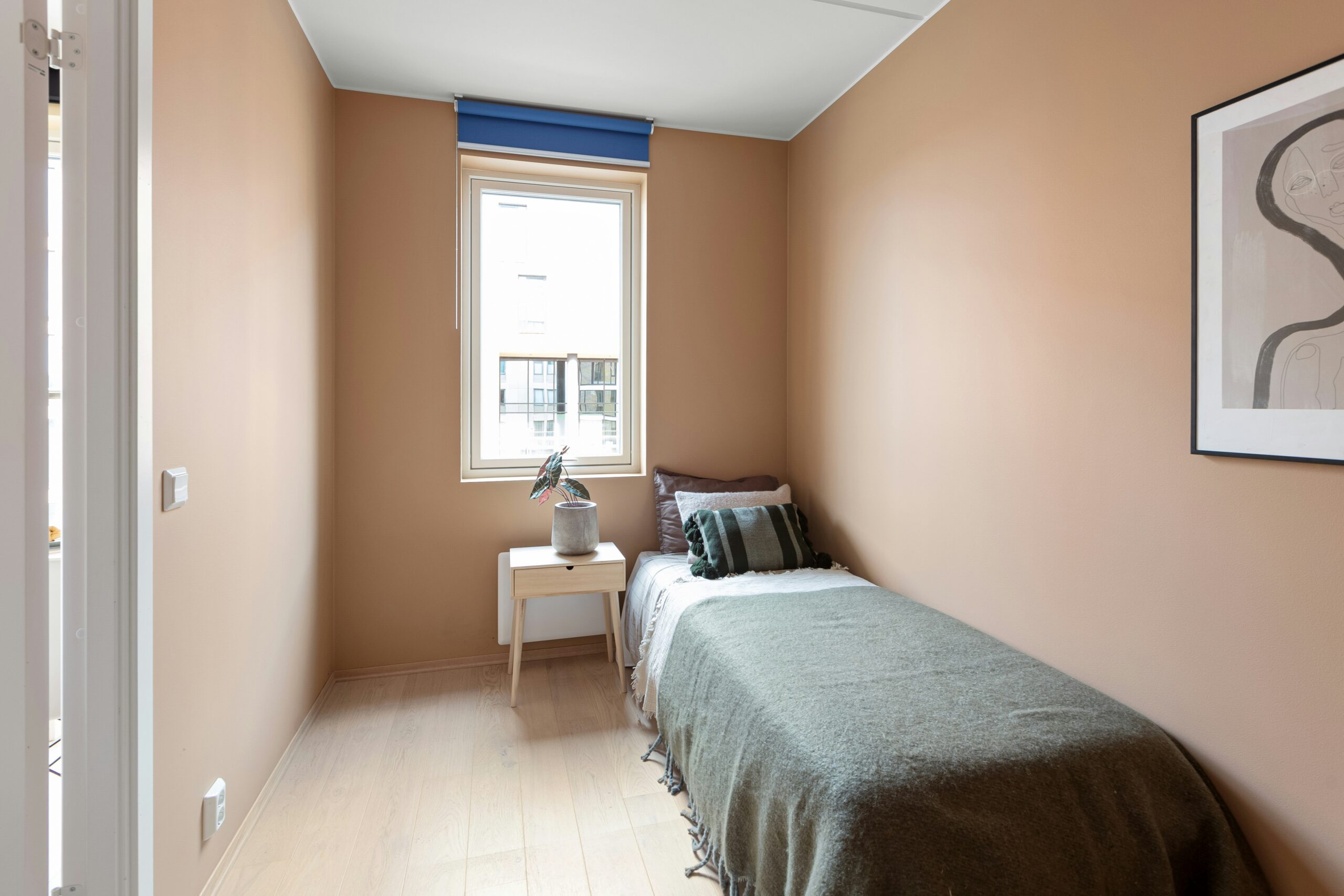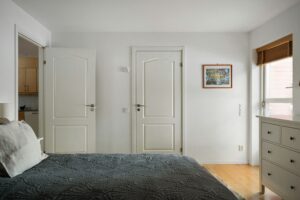What is a Lodging? When Do I Need a Rooming House License?
. Posted in News - 0 Comments
Massachusetts has many kinds of long-term residential housing. The first kind that rental operators know is “an apartment,” which contains all the facilities necessary for cooking, eating, living, sleeping and sanitation behind one set of doors shared to everyone on the same rental agreement. The second is a “lodging.” What’s that?

A triple-decker can be a lodging house under certain circumstances. (Image: cc-BY-SA Brian Corr)
The Lodging House
State law defines a lodging house as “a house where lodgings are let to four or more persons not within second degree of kindred to the person conducting it.” Sadly, the law doesn’t define “lodging.” (It only defines the “lodging house.”)
The meaning of “lodging” was taken up by the Supreme Judicial Court in the 2013 case, City of Worcester vs. College Hill Properties, 465 Mass. 134. We’re surfacing this case text here to make it easier to understand:
“Webster's New Universal Unabridged Dictionary (2003) [defines] lodgings as ‘a room or rooms rented for residence in another's house’.”
The courts cited an 1872 case that described lodgers as lesser-than-apartment holders: "[A] mere lodger in the house of another is not a tenant. . . . [A] man who let rooms to lodgers was still the sole occupier of the house." White v. Maynard, 111 Mass. 250, 253 (1872).” (Don’t get too excited: The 1872 decision saying lodgers aren’t tenants has been overturned.)
The part of this definition that remains in force today is the part about having just a room. A lodger has exclusive use of a room or rooms only, but does not have exclusive use of all the facilities necessary for cooking, eating, living, sleeping and sanitation. Something is shared. That’s what a lodging is.
Sometimes in the more recent code, we see the term “dwelling unit.” That means apartment. We might also see, “rooming unit:” A “rooming unit” is a lodging.
Related Terms: Boarding House, Rooming House
We typically use “lodging house,” “boarding house” and “rooming house” interchangeably when speaking. MGL Chapter 111, Section 199b offers a separate definition of a rooming house, but as this definition is only provided to offer deleading exemptions in highly specific situations, that’s not the main law. A boarding house is a lodging house (see for instance Chapter 148 Section 26H, which uses the terms interchangeably).

What makes a single room occupancy part of a lodging house? The answer depends on many factors. (Image: Lisa Anna for Unsplash)
Understanding the State Lodging House Law
The law is Chapter 140 Section 22: “a house where lodgings are let to four or more persons not within second degree of kindred to the person conducting it.” The phrase “second degree of kindred” means close relatives, including parents or in-laws, adult children and siblings. The “person conducting it” is you, the landlord.
The Relationship Is to You
Sometimes landlords think the problem is with roommates, who aren’t related. No, the problem is whether they are related to you, the landlord. If there are four brothers on four agreements for shared facilities, and they are not related to you, that’s a lodging house. If there are four brothers on four agreements and you’re brother number five, that’s not a lodging house.
Clearest Possible Definition
If there are four people in a building who are not closely related to you, the landlord, and their rental agreements call for kitchens or baths shared with other rental agreements, then yes, you will need a license. That’s a lodging house.
If you have fewer than four such people, or they are closely related to you, or there are no kitchens and baths shared across individual rental agreements, then no, you do not need a license. However, the sanitary code still creates additional requirements (see our other article in this issue).
The Math Is per Building
It’s important to remember the definition of “lodging house” is not per rental unit. It is per building. Three individually rented bedrooms in a single-family home would not be a lodging house. But three individually rented bedrooms in each floor of a triple decker would be a lodging house, because that’s nine people with shared facilities in the building. A duplex with two individually rented bedrooms in each unit (four agreements total) would also be considered a lodging house. You need to consider the number of bedrooms in your entire building.
Here is a summary of the key factors to consider:
- How many agreements have shared facilities?
- How many such agreements are there in the whole building?
If the answer is “four or more,” that’s a lodging house (unless renters are your close family).
Whole-Building Examples
One Agreement. No Shared Facilities. Four People Unrelated to You.
This is not a lodging house. There are no shared facilities. People unrelated to you can sign a single agreement and it doesn’t trigger the state lodging house law. (Careful: local laws might still stop you. For instance, Worcester is singled out in The Complete Landlords’ Guide to Lodging and Rooming Houses in Massachusetts. Note also: All other code applies, including square footage requirements per person.)
The Joint and Several Agreement
With these roommates, all people are on the same lease, and are rented to “jointly and severally.” This means each person in the group is ultimately individually responsible for the full cost of the rent.
The group may divide up responsibility for how the rent is paid between them, without the landlord’s involvement. With a $2,700 month apartment, each of four roommates could pay $675 a month; or one could pay $775, one $575, and the rest $675; etc. If someone doesn’t pay the share they agreed to pay internally, the others are still responsible for making sure the landlord gets the full $2,700.
Under a joint-and-several agreement, all renters have complete access to the apartment. Everyone can use every room, and things such as personal sleeping arrangements and private vs. common space are negotiated between the roommates.
Note: If you put keyed locks on bedroom doors, this becomes gray area. Some cities might cite you for operating a lodging house. If so, show the city the joint-and-several rental agreement. If they won’t back down, let us know. It’s a housing crisis, after all, and you’d be following the rules, mostly. City ordinances may change this, so check locally first.
Four Agreements. One Shared Kitchen and Bathroom. Four People Unrelated to You.
This requires a license.
Licensing requirements would apply even if each room had a shared kitchenette and en suite bathroom, so long as the full sanitary code was not met for a “dwelling unit” inside each room.
If you have elaborate indoor common areas, like large living rooms, movie rooms, exercise rooms or more, and each rental agreement has exclusive use to everything required under the code, including a fridge of adequate size and a place to cook, and a full bathroom, then no license will be required. This model is used a bit in market-rate college housing.
One Agreement. One Bedroom. Three People Unrelated To You.
License required. Trick question! In this situation, your three roommates are renting one bedroom only are not renting a space that contains everything they need for cooking, eating, living, sleeping and sanitary needs. The kitchen and bath are elsewhere, presumably shared with a second agreement. Three people on this one agreement, plus at least one person on the other agreement, will be four people sharing a kitchen across two agreements. This is enough to trip the licensing requirement.
Make sure you also follow the code for egress, square footage, ventilation, etc.
Four Agreements. One Bedroom. Four People Unrelated To You.
License required. Also, the license is not a normal rooming housing license, and is beyond the scope of this article. This sounds like a barracks, shelter or a dorm room, licensed separately even from what we have described here. The sanitary code for landlords does not permit someone to walk through another person’s “rooming unit” to reach a kitchen or a bath. This effectively prohibits sharing rooming units between conventional tenancies.
Nine Agreements, Three per Apartment. Three Shared Kitchens and Bathrooms, One per Apartment. Nine People Unrelated To You.
License required. This is true even though there are less than four people per apartment. It’s counted per building, and the total is four or more per building.
Conclusion
Lodging houses arose in the market to satisfy a need for very affordable housing. They were regulated almost out of existence by the 1970s because they are very difficult to manage well and often ended up being viewed as dens of iniquity (some probably actually were). Be careful if you go down this road. Get a license where required.
We have an in-depth article about rooming houses in Massachusetts that gets into the particulars of operating a boarding house with single-room-occupancy (SRO) leases, as well as a video training series on lodging houses and renting by the room. You can also read more about rooming house licensing requirements. It is unlawful to run a lodging house in Massachusetts without being properly licensed.
Do you operate a licensed lodging house? Let us know your experiences at hello@masslandlords.net.





